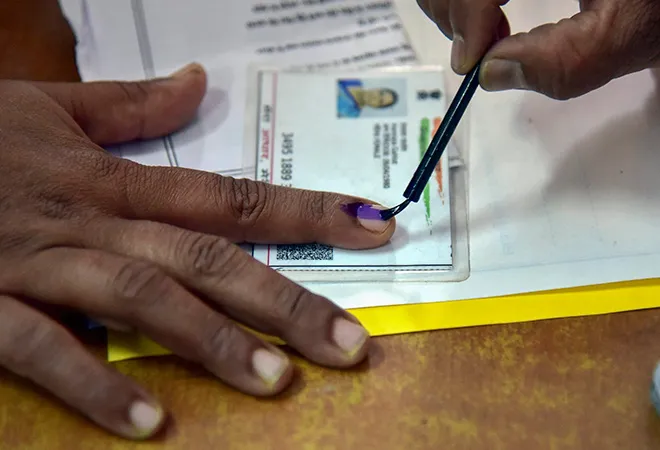
Electoral battle lines are now clearly drawn and are out in the public domain from the drawing boards. The two main national parties ---the Bharatiya Janata Party (BJP) and the Indian National Congress (INC) -- have more less cleared confusion by deciding upon their battle cries and ideological lines that they are going to follow. Two ideologies are competing for people’s favour in the ongoing general elections.
The two parties have set their respective goals and have decided their priorities. Leaders of the both the national parties led alliances are now busy campaigning for their respective candidate and for their respective allies in their effort to catch the people’s attention to garner votes for their parties.
On the one hand, the ruling BJP-led national democratic alliance (NDA) has made crystal clear that nationalism is going to be its defining framework in which national security is going to be a driving theme.
In the framework of nationalism, all other issues like development are going to be addressed. The BJP is stressing upon the issue of national security that is currently under threat from terrorism that is primarily emanating from Pakistan, so goes the narrative.
Ideologically, the BJP is following the “Hindutva” path within which people’s problems are going to solved and resolved. Nation first and rest follows is the leading motif. Details of its plan of action would become public when it releases its manifesto.
On the other through its manifesto, the Congress has declared that it is firmly back on the path of Nehruvian socialism. It will seek the popular mandate in the Nehruvian framework of people’s welfare by focussing on weak, minorities, downtrodden and marginal sections of the society. The grand old party has pledged that through creation of jobs, income support or the poor, healthcare and education it is seeking to revive its political fortunes. The Congress is back to the path of social welfare with emphasis on youth, farmers and poor.
The manifesto is divided into under six sections -- kaam (work), daam (cost), shann (pride), sushan (good governance), swabhimann (self-esteem) and samman (respect). The manifesto’s English version is titled “Congress will deliver”.
The Congress said that 3.4 million jobs would be ensured by filling 4,00,000 Central government vacancies before March 2020, persuading State governments to fill two million vacancies and creating one million Seva Mitra positions in every gram panchayat and urban local bodies. The next Congress government will also have a Ministry of Jobs.
The Congress hopes that through its promise of minimum income support scheme (Nyay), which means a guarantee of Rs 72, 000 annually to 20 per cent of the poorest families of the country, it would get the electoral support.
By promising to allocate 6% of the GDP in the budget to finance education, the Congress has recognised the merit of human resource development without which no nation has been able to tap its real potential.
The manifesto has devoted considerable space to address the challenge of agricultural distress. The Congress has said that it will present a separate ‘Kisan’ budget. Farmers will be put on the path from ‘Karz Mafi’ (loan waiver) to ‘Karz Mukti’ (freedom from loans) through remunerative prices, lower input costs and access to institutional credit.
The Congress has reiterated its commitment to path of reconciliation for resolving conflicts like left-wing extremism or demand of autonomy in Jammu & Kashmir. By declaring that if voted to power, its government would scrap the sedition law that was brought into the stature book by the colonial British rulers, the Congress has recognised the draconian law has no relevance in modern India.
The manifesto also said that laws will be enacted to prevent and punish hate crimes like lynching that created fear in society at large and among minorities and Dalits in particular. Thus, the Congress has shown its commitment to values that promote humanism and social peace.
Similarly, by committing to the dilution of AFSPA -- Armed Forces (Special Powers) Act -- and Disturbed Area Act which provide immunity to security forces in areas hit by insurgency and militancy, the Congress has sought to send a signal to the people of trouble infested areas of J&K and north east. At the same time, the Congress has made categorically clear that acts would be amended in a manner that suitable changes are made in the text of laws to balance the requirements of the security and protection of human rights.
By stating that its government will turn defamation into a civil offence in place of its being a criminal act, the Congress has sought to address the existing concerns in civil society over the gross misuse of the Defamation Act.
In a major announcement in the field of judicial reforms, the manifesto has promised to turn the Supreme Court into a constitutional court that will interpret the Constitution to establish judicial clarity on growing challenges to the constitutional framework of the country. And the role played by the apex court presently will be taken over by a Court of Appeal that will be set up to deal with appeal cases from the High Courts.
Though the Congress has made a determined effort address the concerns of different sections of population with the objective of recapturing its lost political territory, it remains to be seen whether it catches the people’s imagination or is lost and ignored in the competitive discourse of nationalism by the ruling BJP.
The views expressed above belong to the author(s). ORF research and analyses now available on Telegram! Click here to access our curated content — blogs, longforms and interviews.




 PREV
PREV


